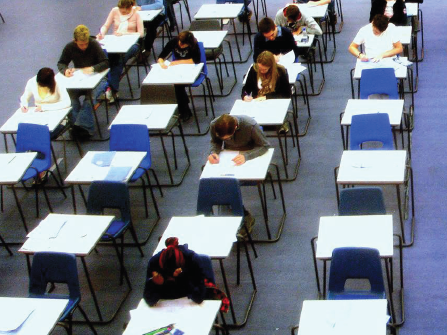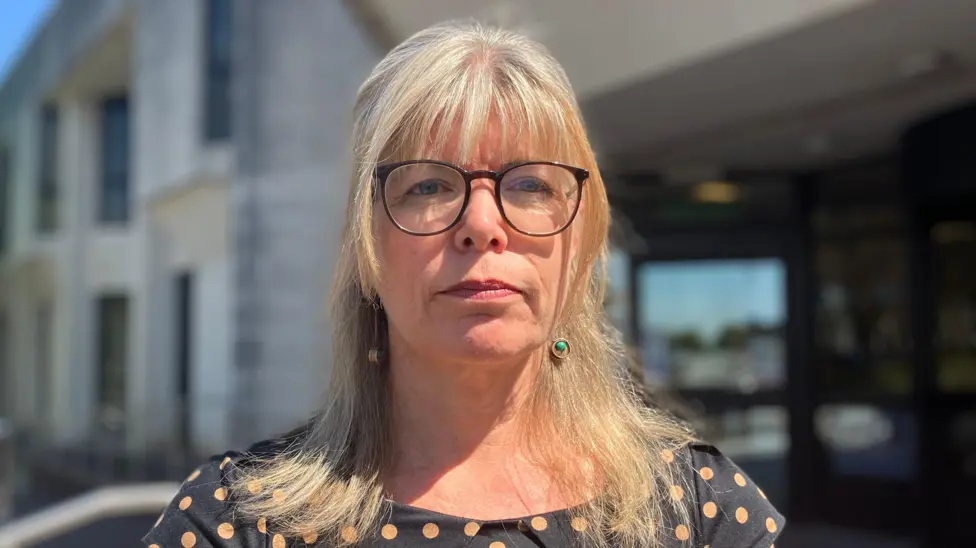Education
UK students are the most tested in the world


Testing: the problem, not the solution
A REPORT by ChildLine, the NSPCC backed children’s helpline, has confirmed what has been reported anecdotally for some time: exam stress is increasing and children are suffering as a result.
UK-wide increases in the level of child testing, dressed up as performance monitoring for schools, is ratcheting up pressure on students to perform; if not for themselves, then for the sake of their schools’ ratings and teachers’ careers.
Peter Wanless, NSPCC chief executive, said: “The pressure to do well is being felt by an increasing number of young people across the country.”
The bare statistics show that ChildLine delivered 3,077 counselling sessions about exam stress to school pupils in 2015-16. Almost a quarter of this counselling took place in the lead-up to exam season.
The UK Government has faced criticism for turning schools into ‘joyless exam factories’, while it has continued to extend its testing regime to include children as young as six. In Wales, where the Welsh Government has formerly reduced the amount of testing, the political controversy over Wales’s standing in the PISA results table has resulted in the reintroduction of some testing.
Whether this is to help students improve their results or make the Welsh Government feel better about its own failings, by shifting the blame for years of under-achievement on to schools and their staff, is unclear.
CHILDLINE FINDINGS NOT ISOLATED
ChildLine is not alone in noting a trend towards increasing anxiety and stress in school children.
A survey of 338 mostly secondary school heads carried out by the Association of School and College Leaders (ASCL) found that more than half (55%) have seen an increase in anxiety and stress among pupils in the last five years.
Former adviser to the UK Government Natasha Devon, who was fired after suggesting that the increase in anxiety and stress in pupils was directly tied to its reliance on testing, testing, testing.
In her TES column following her dismissal, Ms Devon said ‘Our government claims to be prioritising children’s mental health while apparently aspiring to an academic system implemented by countries where the child and adolescent suicide rates are staggering’.
She continued: “Arguments about ‘resilience’ and ‘grit’ are being used to justify piling unlimited amounts pressure on children. Stress is to mental health what avocados are to dieting – only a little is helpful. Furthermore, children (particularly those at primary age) are still in developmental stages where stress can impair cognitive development.”
While Ms Devon was talking specifically of the situation in England, it would be a mistake to believe that Wales was not affected by the same problems.
In 2014, UCAC, the Welsh teachers’ union, warned the then education minister Huw Lewis that testing was destroying the confidence of young learners.
Members of the union NUT Cymru said the reading and maths tests put too much pressure on children too young. One incident was reported in which a child stopped eating because of the stress caused by testing. NUT Cymru claimed the tests had little impact on attainment.
It was, however, the PISA results that caused the Welsh Government to reintroduce tests for seven year-old children.
IS THE TOWER OF PISA TOPPLING?
The Programme for International Student Assessment (PISA) is operated by the Organisation for Economic Cooperation and Development (OECD). The OECD is is an international economic organisation of 34 countries, with 25 observer members, founded in 1961 to stimulate economic progress and world trade.
It is a forum of countries describing themselves as committed to democracy and the market economy, providing a platform to compare policy experiences, seeking answers to common problems, identify good practices and coordinate domestic and international policies of its members.
So, PISA – and its rankings – are a method of identifying and sharing good practice combined with the coordination of policies (of which education is one).
That is all fine, you might think, especially if you are of an internationalist market-economy cast of mind.
However, the bases upon which PISA compiles the league tables are far from standardised across the OECD nations.
Countries are ranked separately in reading, maths and science, according to scores based on their students’ achievements in tests.
Those test scores are, however representative only as they are tweaked to fit a common scale, where the OECD average is always 500.
But all students participating in PISA are NOT asked to respond to exactly the same questions. Some students are not asked any questions on reading and, in 2006, science was the ONLY test subject faced by all students.
Professor Svend Kreiner an expert in bio-statistical modelling says PISA is ‘not reliable at all’. And he should know: the statistical system PISA uses to create its controversial tables was created by his own student mentor.
Professor Kreiner says: “I am not actually able to find two items in PISA’s tests that function in exactly the same way in different countries. There is not one single item that is the same across all 56 countries. Therefore, you cannot use this model.”
TES reported in 2014 that if tests were administered slightly differently, Denmark – held out as a beacon of good practice – would fall down the table of 56 countries to number 37 from its perch at number 5.
So, far from being some sort of educational penis-measuring exercise embarked upon every three years, the PISA tests are a statistical tool of dubious value applying non-standard criteria to students and educational systems that vary in terms of their development , maturity, and cultural backgrounds.
In addition, being a tool of an organisation favouring one set of economic solutions to the world’s economic problems, there is the distinct danger that children are being viewed in terms of their future utility to the native economies than valued in and of themselves.
TESTING THE FUTURE
Kevin Courtney, deputy general secretary of the NUT teaching union says: “Teachers see very clearly the effect of stress on students and are reporting exam stress among school children from primary school upwards.
“Many relate it to the joyless examfactory approach this government has towards education, and the high-stakes nature of testing.
“We have the most tested children in Europe and also some of the unhappiest in the world.”
A retiring head teacher, Kit Messenger, wrote in her letter of resignation: “Judgments made of schools are now so restricted to a small set of measures that the pressure to focus only on reading, writing and mathematics has become untenable and I have increasingly felt that we are ‘factory farming’ our children and failing to prepare them adequately for a successful future in this changing world.”
If students are becoming more stressed, and there is every sign that are, there is a distinct danger that they will become disillusioned not only with the education system but the process of learning itself. With a focus on hitting hard targets under examination, students – even the keenest of learners – can develop a skewed and purely utilitarian view of education and what education is for.
There is a lot of grumbling from employers’ organisations about students not being provided to industry able to write, to spell, and to do simple arithmetical problems. Interestingly, there always has been.
Every year for as long as the writer can remember, and certainly stretching back to his own school days, a talking head will appear on the TV news claiming that schools are not equipping school leavers for jobs and ‘the needs of business’.
It’s enough to make the historically minded observer wonder whether there was EVER a period when businesses were content with the product of state education.
Thumbing through news articles and government reports stretching back over sixty years while researching this article, the answer to that question is ‘apparently not’.
But what has changed, in order to try to ‘meet the needs of business’ is an increasing reliance on tests and testing of children en masse, while losing sight of the value of the individual’s journey through the education system.
The stripping away of music, art, history, and a host of other subjects, means that students are losing a sense that learning is rather more than simply testing them in order to allow Education Ministers to smile smugly at PISA tables.
It is at least arguable that testing is not curing the problem of preparing pupils for the needs of business and commerce, but exacerbating and – to an extent – creating a cadre of students who will simply drop out of learning due to stress, pressure and a lack of opportunity to acquire knowledge for its own sake.
After all, with the pleasure stripped out of learning, what motivation is there for a child of eleven to acquire skills that will help a stranger aged eighteen get a job?
Such outcomes would not be teachers’ faults; that would be the fault of the system.
Community
Letterston nursery equipment could be stored in cemetery

A CALL for a storage container for a “well-established and valued” Pembrokeshire children’s nursery in a nearby cemetery has been submitted to county planners.
In an application to Pembrokeshire County Council, Diane Evans of Meithrinfa Do Re Mi Nursery seeks permission for the installation of a storage container, partially in retrospect, at Horeb Cemetery, Station Road, Letterston.
A supporting statement says: “The container is required to provide essential ancillary storage to support the lawful and established nursery use within the [nearby] chapel building.
“The site forms part of an active cemetery, owned and managed by a group of trustees. The applicant is one of the trustees and has obtained formal permission from the trustees for the container to be sited on this land. The area selected previously comprised a large, longstanding mound of garden waste which has now been removed. The land has been levelled and prepared with a hard-standing base.
“The container will be used solely for storage of nursery equipment and materials, including outdoor learning resources, maintenance equipment, and items required to manage both the nursery grounds and the cemetery land. No additional operational activity will take place within or around the container.”
It adds: “The day nursery provides childcare for approximately 83 children from the local community and employs 21 staff, all of whom live locally. The nursery is a well-established and valued community facility, supporting local families and contributing positively to the local economy. Adequate storage is essential to ensure the safe, efficient and compliant operation of the nursery. The chapel building itself has limited internal storage, making external ancillary storage necessary.”
It says the nursery “operates with a strong community focus and promotes sustainability and environmental awareness,” with plans to soften its appearance through the planting of trees, shrubs and flowers.
It added: “Children will take part in a ‘sow, grow and give’ project, growing cut flowers from seed. These flowers will be made available to the community, particularly visitors to the cemetery, who will be invited to cut flowers to place on the graves of loved ones. This initiative enhances biodiversity, strengthens community links, and adds social value to the cemetery space.”
The application will be considered by county planners at a later date.
Education
Parents urge council not to close Ysgol Llansteffan

Campaigners call for delay amid Welsh language investigation and rising pupil numbers
PARENTS and campaigners have urged Carmarthenshire County Council’s Cabinet not to recommend the closure of Ysgol Llansteffan when members meet on Monday (Feb 23).
The appeal comes ahead of a proposed decision that could see the village’s Welsh-medium primary school close in August this year.
The Ysgol Llansteffan Parents and Teachers Association (PTA), supported by Cymdeithas yr Iaith, has written to councillors calling for the process to be halted, arguing that key evidence remains incomplete and that the case for closure is flawed.

Among their concerns is an ongoing investigation by the Welsh Language Commissioner into the language impact assessment used to support the closure proposal. Campaigners say it would be inappropriate for the council to make a final decision before the investigation is concluded.
They also claim no council decision-makers have visited the school to verify the information used in the proposal, despite significant changes in circumstances, including a rise in pupil numbers to 17 as of January 2026.
The PTA argues that this increase undermines earlier projections and raises questions about the reliability of longer-term forecasts used to justify closure.
Financial concerns have also been raised. While council documents suggest annual savings of around £112,000, campaigners say transport costs of approximately £50,000 per year and inflationary pressures have not been clearly accounted for, potentially overstating the net benefit.
Parents say closure would remove parental choice and risk damaging Welsh-medium education in the area by forcing some children to travel further or potentially move into English-medium provision.
Cymdeithas yr Iaith has backed the PTA’s call, warning that the council’s objection report failed to properly address concerns that insufficient school capacity elsewhere could push pupils out of Welsh-medium education altogether.
Campaigners have also criticised what they describe as factual inconsistencies in the council’s reports, including outdated enrolment figures and conflicting capacity estimates for neighbouring schools.
The PTA has asked the council to defer any decision until updated data is available, the Commissioner’s findings are published, and alternative options for sustaining the school have been fully explored.
In their letter, parents stressed they remain willing to work constructively with the council to develop a long-term solution that would allow the school to remain open as a sustainable Welsh-medium provision for the community.
Carmarthenshire County Council has previously said the proposal is intended to address falling pupil numbers, high surplus places and financial pressures at the school. Cabinet members were told earlier in the process that neighbouring Ysgol Llangain would have sufficient capacity to accommodate pupils if the closure proceeds, and that transferring learners would provide access to improved facilities and help ensure long-term sustainability of education provision in the area.
The final decision is expected to be taken by full council in March following the Cabinet’s recommendation.
Crime
Teacher stabbed by pupil criticises school weapon scanner plans

Victim says teachers should not be turned into “security guards” after Ammanford attack
A TEACHER who was stabbed multiple times by a pupil at a Carmarthenshire school has criticised proposals to introduce weapon scanners in classrooms, warning they risk shifting responsibility onto already overstretched staff.
Liz Hopkin was attacked by a teenage student at Ysgol Dyffryn Aman, Ammanford, in April 2024, in an incident that shocked communities across Wales.
Speaking to BBC Radio Wales, Ms Hopkin said she does not believe scanners are “the answer” to preventing violence in schools and warned they could undermine relationships between teachers and pupils.
She said the focus should instead be on preventing young people from bringing weapons to school in the first place.
“This isn’t about preventing people bringing knives into school in the first place. This is just about detection,” she said.
“If by the time you’ve got the knife in school, you’ve missed so many opportunities prior to that to stopping that knife coming in in the first place.”
Ms Hopkin also warned that introducing scanning responsibilities could place teachers in unsafe and inappropriate situations.
“To stop putting the responsibility onto schools — we already have enough responsibility with less and less and less resources,” she said.
“You’re adding the role of security guard to teachers who are trying to build relationships with young people.”
Despite suffering serious injuries in the attack, she said she still did not believe scanners were the right approach.
“In my own head, as somebody who’s been right at that point where I’ve been stabbed — I was stabbed five times and feared that I would die — I still don’t think it’s a good idea,” she said.
The Welsh Government told the BBC that its work around weapons in schools forms part of a wider strategy to improve behaviour, with a strong emphasis on prevention rather than enforcement.
Officials said any decision to use scanners would be made by individual local authorities, and there is no expectation that teachers or school staff should carry out security duties.
Some councils have already trialled handheld scanners. Cardiff Council has supplied them to schools, but they are only used when there is a clear concern a pupil may be carrying a weapon.
The stabbing at Ysgol Dyffryn Aman led to renewed debate about school safety across Wales, including behaviour management, pupil support services, and funding pressures facing education.
Ms Hopkin added: “I would never ever suggest that anybody put themselves at risk to check. That’s not our role.”
(Image: BBC)
-

 Health5 days ago
Health5 days agoWithybush loses emergency surgery in shock health board decision
-

 Health4 days ago
Health4 days agoHealth board confirms major hospital changes across west Wales
-

 Health3 days ago
Health3 days agoConcerns grow over Bronglais stroke plans as politicians demand clarity
-

 Health4 days ago
Health4 days agoHealth board: Changes will bring “resilience and sustainability” to West Wales services
-

 Local Government2 days ago
Local Government2 days agoCandidate who withdrew from Hakin race will still appear on ballot paper
-

 Business7 days ago
Business7 days agoMS’s host business advice surgery following demand from Business Rates Online Forum
-

 Crime7 days ago
Crime7 days agoMan charged with GBH with intent following incident involving ‘Pembrokeshire Patriot’
-

 Crime7 days ago
Crime7 days agoTeen given community order after assaulting police officer at hospital




























